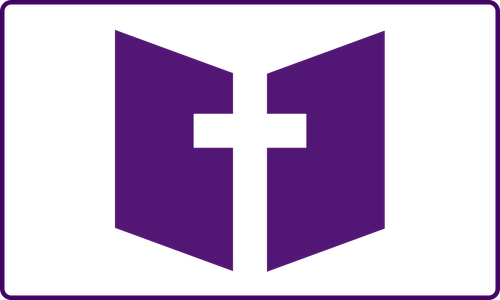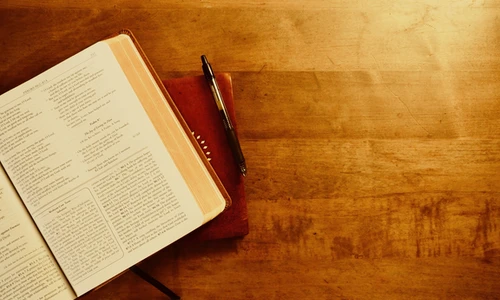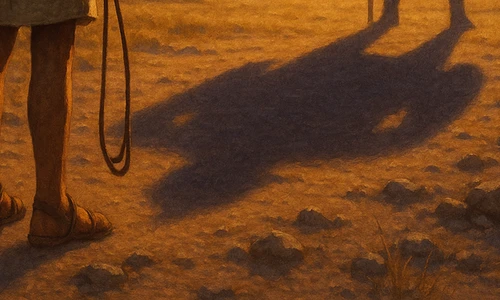Hear Isaiah 16:3-5:
“Give counsel;
grant justice;
make your shade like night
at the height of noon;
shelter the outcasts;
do not reveal the fugitive;
let the outcasts of Moab
sojourn among you;
be a shelter to them
from the destroyer.
When the oppressor is no more,
and destruction has ceased,
and he who tramples underfoot has vanished from the land,
then a throne will be established in steadfast love,
and on it will sit in faithfulness
in the tent of David
one who judges and seeks justice
and is swift to do righteousness.”
Moab is fleeing an invasion into their land (Isaiah 15:1), and Zion is instructed in these verses to give her shelter.
This is not an economic decision, or a political decision, or really even a moral decision. This is an empathetic decision. Israel knows what it’s like to have your land invaded and be forced out. Israel knows what it’s like to be a “stranger in a strange land” (Exodus 2:22). They know what it’s like to try to sing the songs of Yahweh by the banks of a foreign river (Psalm 137:4).
And so there is no calculus. No question of what it will do to GDP; no concern over the mixing of tribes—even though Moses quite clearly warned them not to associate with Moabites (Deuteronomy 23:3–6) and once their intermarrying with Moabites resulted in God sending a plague that killed 24,000 Israelites (Numbers 25:1–9); no worries about immigration limits or green cards or legislation. Just: “Shelter the outcasts.”
How long, O Lord, must we shelter the outcasts? How long must we bear this burden of foreigners in our streets, our houses, our schools?
“[Until] the oppressor is no more, and destruction has ceased”, answers the Lord. Until the promised Davidic king sits on His rightful throne. One day, this miracle will be, and at that point—and not before—you, Israel, may submit your Moabite neighbors to His justice.
Three Modern AnaloguesPermalink
On this Fourth of July, I am reminded by Isaiah’s words of three things that shed light on how we might apply Isaiah’s words—God’s Word—to ourselves in 2020.
The New ColossusPermalink
First, the inscription1 on the Statue of Liberty. Read these words with Isaiah in your mind:
Not like the brazen giant of Greek fame,
With conquering limbs astride from land to land;
Here at our sea-washed, sunset gates shall stand
A mighty woman with a torch, whose flame
Is the imprisoned lightning, and her name
Mother of Exiles. From her beacon-hand
Glows world-wide welcome; her mild eyes command
The air-bridged harbor that twin cities frame.
“Keep, ancient lands, your storied pomp!” cries she
With silent lips. “Give me your tired, your poor,
Your huddled masses yearning to breathe free,
The wretched refuse of your teeming shore.
Send these, the homeless, tempest-tost to me,
I lift my lamp beside the golden door!”
And indeed, those welcomed under that beacon-hand were sometimes, like Israel and Moab, not friendly back in the old world. Don’t get me wrong—America is not Zion, and Zion is not America. But the empathy is the same: “We too know what it is to be not fit for the old world and to seek a new one.” Christians the world over should recognize that compassion.
Bad Moon RisingPermalink
Second, a scene from the “Bad Moon Rising” episode (S2E19) of The West Wing. Mexico is about to default on a debt, and the United States, under President Josiah Bartlett, is planning on stepping in to backstop the debt. Donna, in her perennial role of devil’s advocate, asks why we should bail them out. Eventually, Josh, frustrated because not everyone has his unwavering confidence in the rightness of his decisions, finally throws a quote from President Franklin Delano Roosevelt in her face:
If your neighbor’s house is on fire, you don’t haggle over the price of your garden hose.
Actually, FDR said this:
Suppose my neighbor’s home catches fire, and I have a length of garden hose four or five hundred feet away. If he can take my garden hose and connect it up with his hydrant, I may help him to put out his fire…I don’t say to him before that operation, “Neighbor, my garden hose cost me $15; you have to pay me $15 for it.”… I don’t want $15—I want my garden hose back after the fire is over.
The sentiment is the same! Isaiah could have written those words: “If your neighbor’s country is being invaded, you don’t haggle over the rent in Zion.” Well, he would have written a poem. And he wouldn’t have asked for the hose back. He would have said, “Look, don’t worry about it for now. But when the Davidic king is on the throne, the Son given in chapter 9 and the root of Jesse from chapter 11, go ask Him what to do about the hose.” And then we may ask ourselves, “What would Jesus do?”
The West Wing presents this bailout of Mexico as a liberal position, but Christians should recognize it as an empathetic position instead. Again: “We too know what it is to have your country invaded and have nowhere to go.”
🇭🇰➡️🇬🇧Permalink
Finally, a very recent event: the United Kingdom has offered immediate extended emergency entry to more than 3.3 million Hong Kong residents in the wake of China’s incursion into Hong Kong’s sovereignty. UK Foreign Secretary Dominic Raab said,
This is a special, bespoke, set of arrangements developed for the unique circumstances we face and in light of our historic commitment to the people of Hong Kong.
No limits, no quotas, and a minimal application process round out the massive offer of asylum. And any Hong Kong resident who takes the UK up on its offer will be eligible to apply for UK citizenship in just five years.
There are a host of unanswered questions about this arrangement, as it was just announced days ago, not least of which is whether Hong Kongers want to leave their homes for the UK.
But again, we see the strains of empathy: “We too know what it is to have your freedoms assaulted by a foreign power.”2 Christians should recognize the intense curtailing of freedom of expression and the empathy that says, “Hey, we’ll take care of you.” It even has Isaiah’s rule of worry-about-it-later: that five-year timeline sounds an awful lot like the beginnings of, “When the oppressor is no more…”
Now What?Permalink
I hadn’t intended to write a Fourth of July piece. This weekend, I meant to write a piece on the Ammonites to accompany the one on the Moabites.
But Isaiah reared up and asked me to write about empathy. I haven’t addressed a million issues you’re probably thinking about—President Trump’s immigration policies; travel bans imposed by COVID-19; the convoluted path to US citizenship; whether Josh and Donna ever got together3—but that’s okay. Read the passage from Isaiah again, and consider that God invites us all to Zion without limit, without restriction, with only one requirement: to submit to the everlasting and eternally increasing reign of Jesus the Christ.
If that’s God’s plan… what’s ours?
-
The poem is a sonnet called The New Colossus by Emma Lazarus. ↩
-
Yes, I know, historically, it was often the UK doing the assaulting, which ironically is one reason they’re so intertwined with Hong Kong in the first place. But that was then, and this is days ago—a clear movement toward empathy, which is my point. ↩
-
There is that hotel scene… ↩



